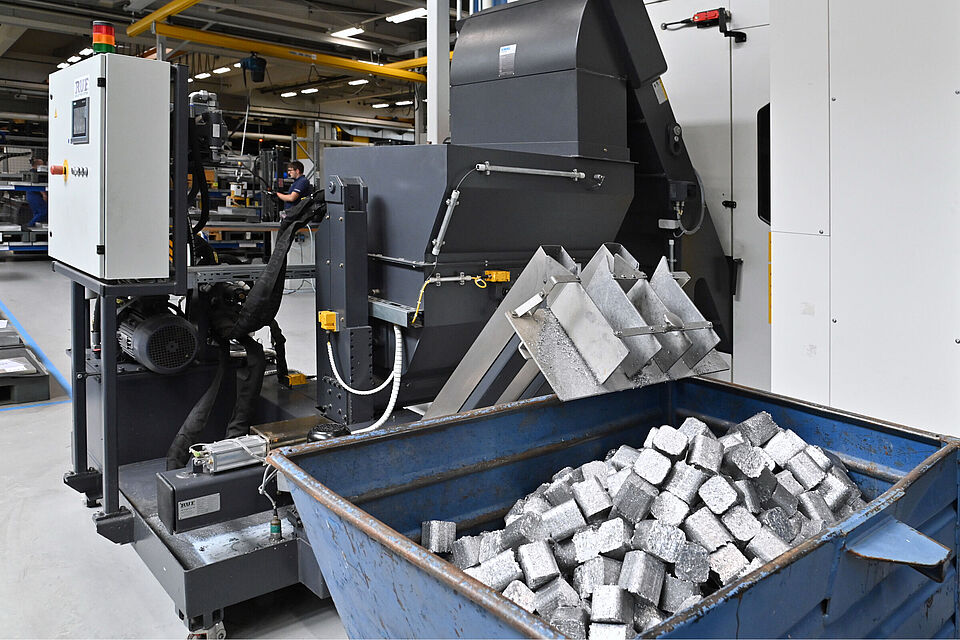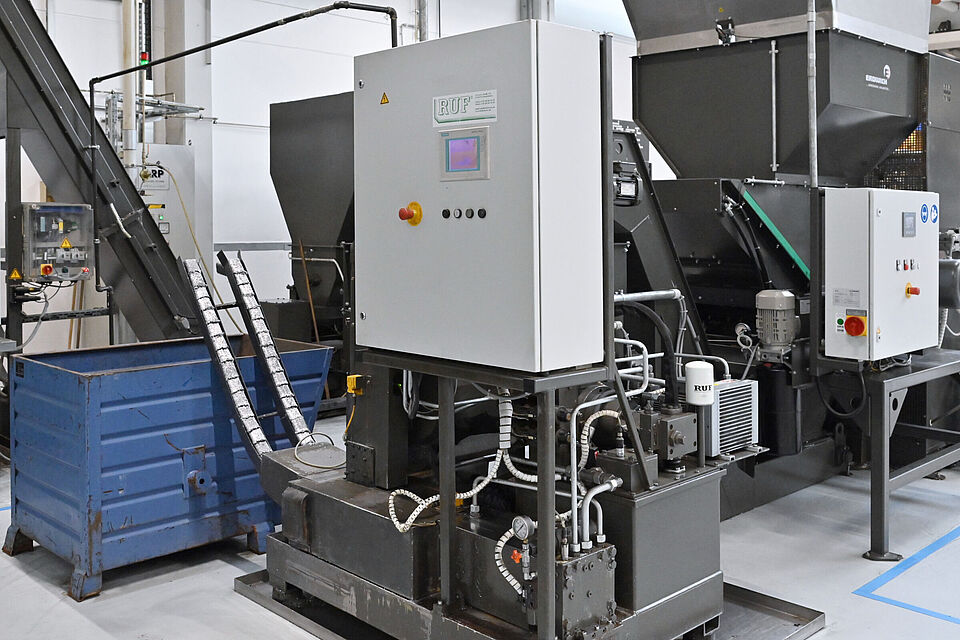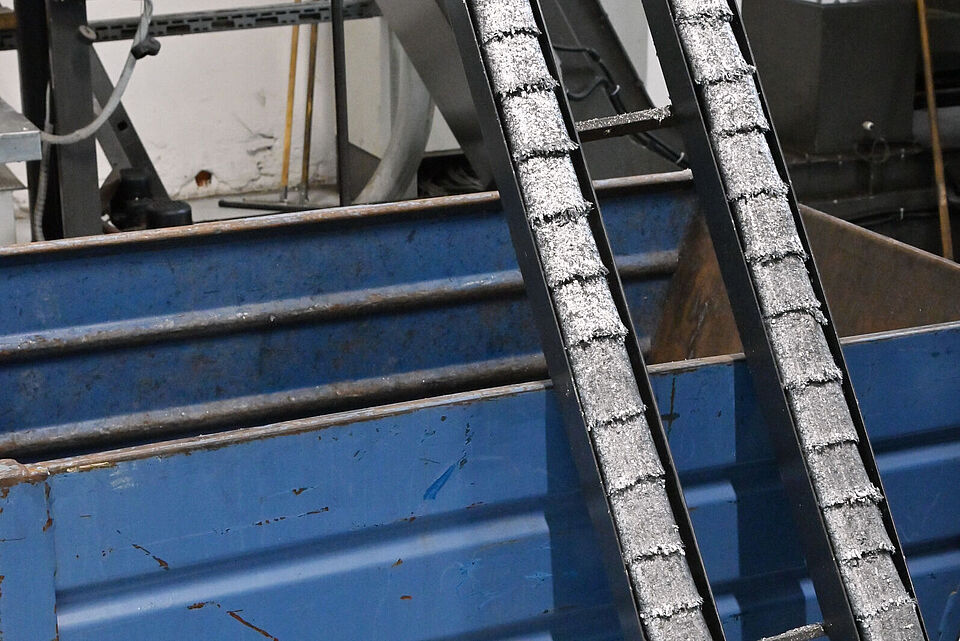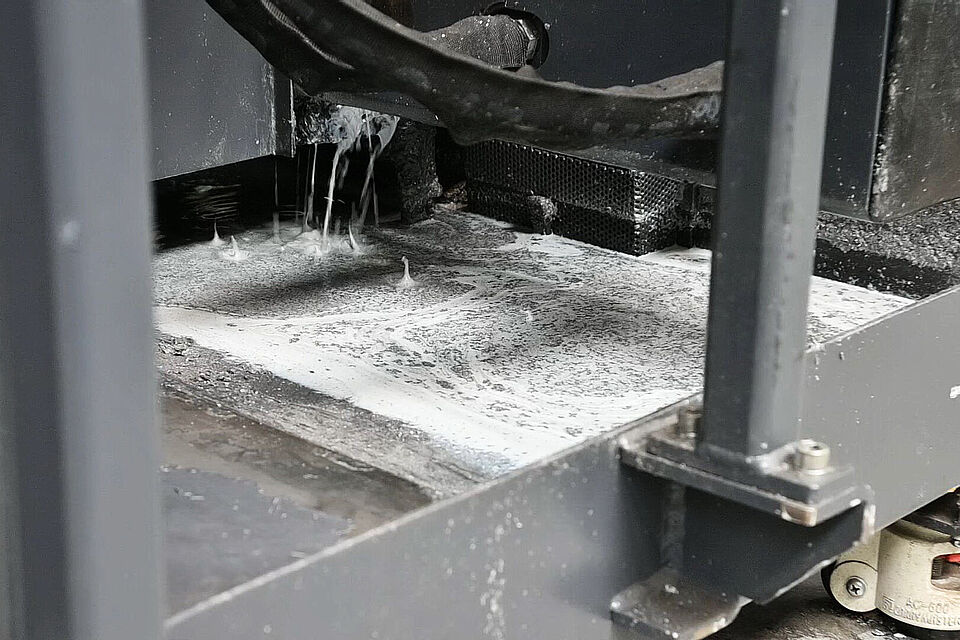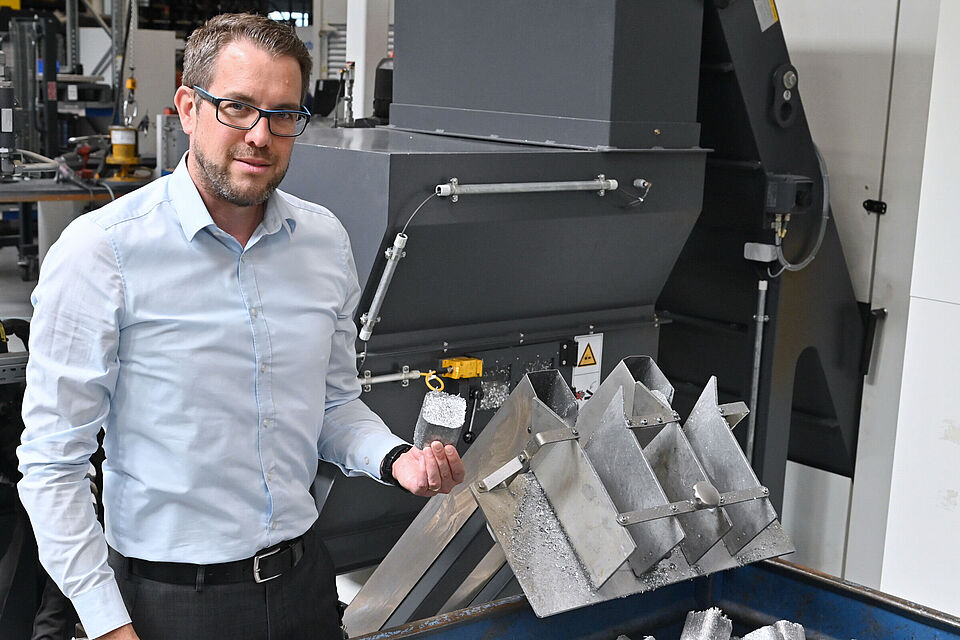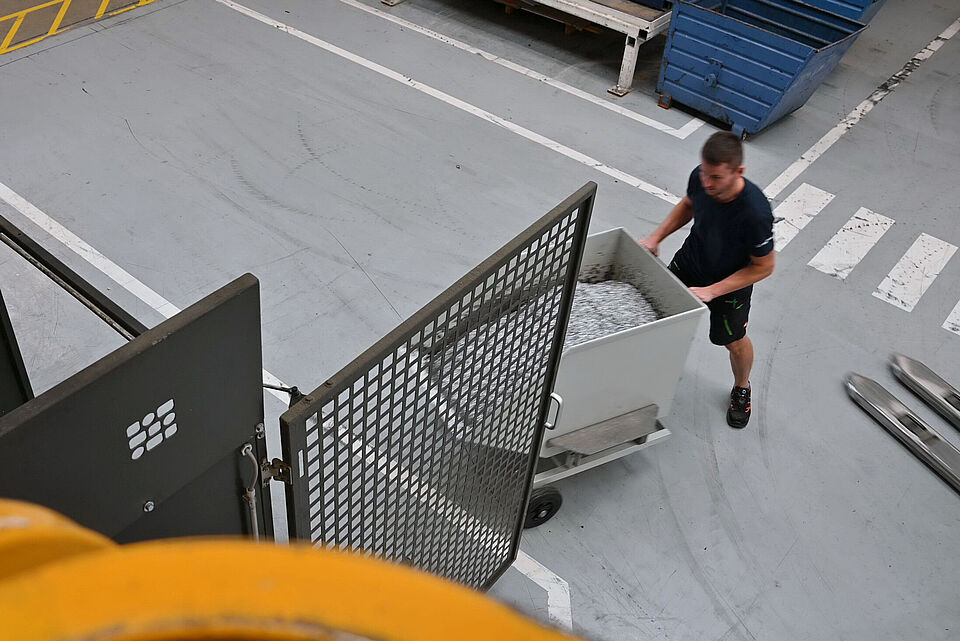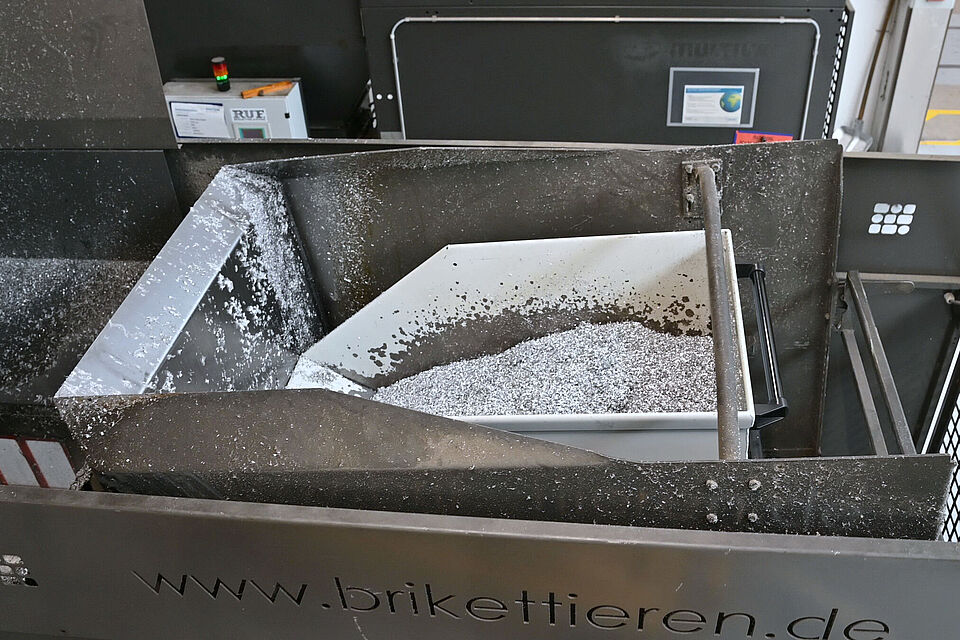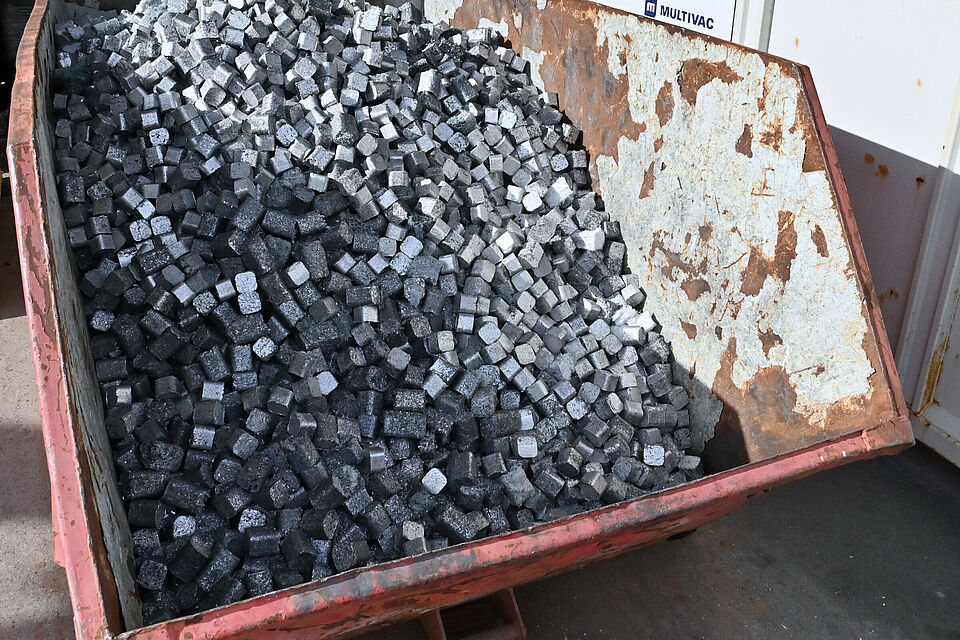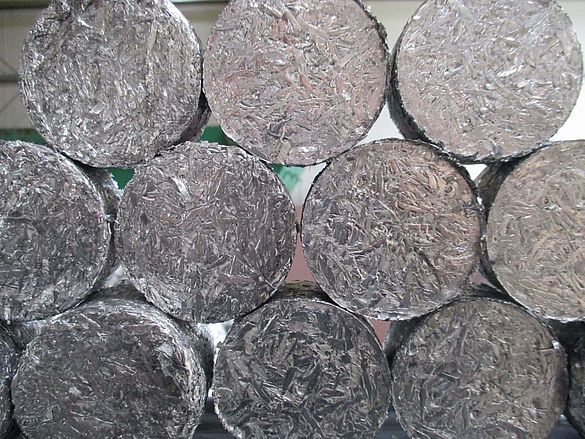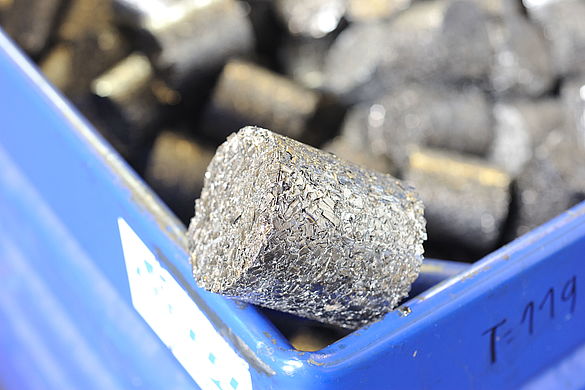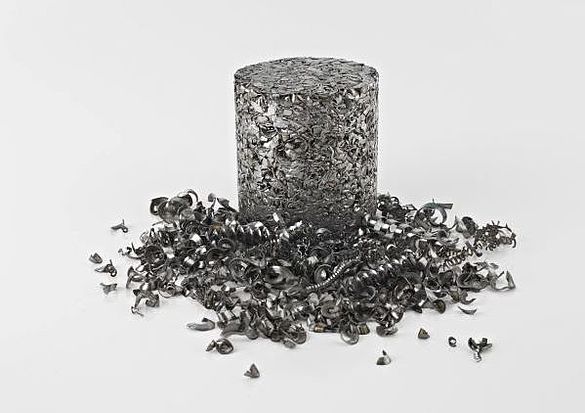Briquetting simplifies chip handling logistics RUF SYSTEMS HELP MULTIVAC TO STREAMLINE ITS CHIP HANDLING PROCESSES AND TO RECOVER COOLANTS
A leading provider of packaging and processing solutions, MULTIVAC enjoys enhanced production efficiency and sustainability thanks to RUF briquetting systems. Eleven of these systems in total compress into compact briquettes about 300 tonnes of aluminium chips accumulating from this company’s milling centres. In the process, virtually all of the entrapped coolant is extracted and reintroduced to the production cycle. This simplifies the chip handling logistics, cuts coolant costs, and increases earnings from aluminium chip sales.
Based with its principal production facilities in Wolfertschwenden, the MULTIVAC Group ranks among the world’s leaders in the packaging and processing sectors. Its machines process, package, and handle foodstuffs, industrial commodities, and medical products. Of the systems manufactured in Unterallgäu, 90% are exported.
The key success factors are their sustainability and economy. For example, the MULTIVAC location in Wolfertschwenden was certified by the sustainability ratings agency EcoVadis in 2023 and awarded the Silver Rating. The processing and packaging specialist therefore ranks among the top 25% of the companies analysed by EcoVadis. The sustainability strategy pursued by the company is based on long service lives and high machine quality for its customers and the promotion of circular economy in its production.
This also extends, for instance, to the recycling of aluminium chips accumulating from its machining operations. They are generated during the production of the so called format sets, which are designed to provide the optimal packaging geometry for each product.
When handling chips, MULTIVAC has never ceased to create, refine, and apply sustainable solutions for the extraction of entrapped coolants. The company’s long-standing solution was based on centrifuging. This involved extracting the chips directly at the machining centres and conveying them over a central piping system to a crusher, after which they were routed to a centrifuge. From there they were transported in containers to the smeltery, where they were reintroduced to the materials cycle.
Yet when an additional expansion was planned for the production capacities some ten years ago, Jürgen Reichart, Maintenance Department Head at the Wolfertschwenden plant, and the production managers sought ways and means to optimise even further their handling processes for the greater chip volume. They then came across the briquetting technology developed by RUF.
First, in 2012, MULTIVAC installed a RUF briquetting press type 4/2400/60×60 at a central site. The type designation is interpreted as follows: a power draw of 4 kW generates a maximum specific briquetting pressure of 2400 kg/cm2 that compresses the chips into cubes whose sides are 60 mm in length. At the same time, virtually all of the coolant entrapped in the chips is extracted.
This solution first served to compress into manageable briquettes a range of chip materials provided by various machining centres. Up to the present day, this system is supplied manually with chips. They are transported in roller containers to the system, where they are dropped by means of a hoist into the charging hopper. There they pass through a crusher before entering the press, which starts automatically. The finished briquettes are ejected into a collecting container.
Nine presses installed directly at machining centres
“We had such encouraging experience with the first press that we immediately decided to install another ten briquetting systems of the same type [RUF 4/2400/60×60],” said Jürgen Reichart. This expansion to production of course also meant a considerable increase in chip quantity. Today, this volume amounts to about 770 tonnes a year, of which 300 tonnes are briquetted.
Nine of the additional systems MULTIVAC installed directly at the machining centres, where the RUF presses can play out one of their strengths, namely their unattended 24/7 mode. Production capacities can therefore be utilised to a good extent for the optimal production efficiency at MULTIVAC. The briquetting presses were integrated directly at the milling centres whose chips they compress. The systems start and stop automatically: when enough chips have accumulated at the milling centres and when all chips have been briquetted. Manual handling is therefore superfluous.
Briquetting systems ideal for unattended night shifts
This is crucial to MULTIVAC, as Reichart explains: “The milling operations on our components sometimes generate an enormous quantity of chips. Many systems run unattended overnight, so the chip containers at the machining centres would overflow. By using briquetting presses, we can reduce the chip volume to about a tenth. We can then use standard containers for collecting the briquettes.” These compact containers of 1 m3 capacity can easily take all of the briquettes ejected overnight by the RUF systems. They need to be exchanged for empty ones only in the following early shift. This also proves an advantage during the day because the briquette containers need to be exchanged far less frequently than loose-chip containers of similar capacity.
The greatest benefit presented by the simplified logistics affects the press economy. Reichart explains: “What decided us was the actual savings in inhouse chip transport and the transport of briquettes in our own containers to the smeltery.” These benefits are so far reaching that briquetting proves a viable solution despite its relatively short average runtime of 640 hours a year.
Equally important are the direct savings in the form of increased earnings. For instance, the coolant extracted from the chips is pumped out of the briquetting system through a filter and returned directly to the originating machining centre. Samples taken by MULTIVAC indicated savings of about 700 litres a week on the one large milling machine. This equates per system to annual coolant savings of EUR 3500–4000.
Briquettes yield greater returns than loose chips
And Department Head Reichart names yet another benefit: “The smeltery is prepared to pay a higher price for compact briquettes than for loose chips. Although this additional revenue does fluctuate, it is nevertheless there.” Each tonne of MULTIVAC’s briquettes supplied directly to the smeltery achieves a price EUR 30–100 higher than loose chips. It must be understood that this difference is not based on a comparison with wet chips, but with the centrifuged chips of low moisture content.
These advantages are obtained with a relatively small amount of work. Over the whole period of operations, there were only very few repairs owing to wear and tear: For instance, the press cylinders in this time had to be replaced in only two of the eleven presses. Otherwise, the systems demand little supervision. Usually, some weekly superficial cleaning proves adequate. Once a year, each press undergoes a technical inspection and thorough cleaning; there is a quarterly inspection of the PERMA lubrication systems; and once a month the coolant catchment trays must be cleaned. According to Reichart’s calculations, this adds up to about five and a half human-hours per year and machine. RUF machines are therefore the perfect solution in MULTIVAC’s pursuit of maximised efficiency.
The MULTIVAC Group …
… has ranked among the leading manufacturers of packaging machines for over 60 years. The main plant in Wolfertschwenden is the birthplace and principal production location of the MULTIVAC Group, today a global player. MULTIVAC is joined by Fritsch, specialising in bakery installations and technology, and TVI, developing innovative solutions for refining and portioning meat products. The Group operates in 160 countries on all five continents from over 80 locations including 14 production sites. Since its founding in 1961, the company has remained in private ownership. It now employs about 7000 worldwide.
Multivac Sepp Haggenmüller SE & Co. KG
Phone: 08334 601-0
Email: multivac@multivac.de
Internet: multivac.com/de


